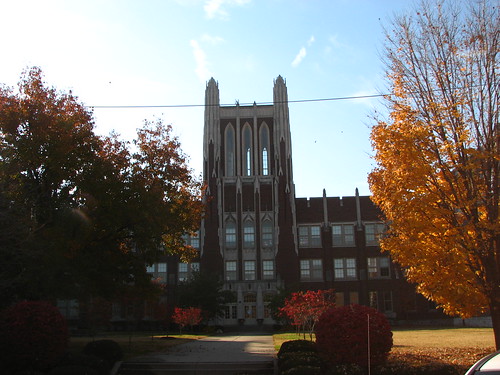Many people like to beat up public education. And, of course, public education can use improvement. But I've always objected to comparing public school scores to private school scores as a measure of success. It's apples and oranges.
Private schools can kick you out. Public schools can't - not easily. Private schools you have to work to get in - there has to be at least parental effort involved, if not student effort. And do you know what studies indicate the #1 predictor for student success? Not socioeconomic factors (although that plays a big role). Not parental education level. Not even student aptitude. The #1 predictor for student success is parental involvement and concern.
So of course, it is not surprising that private schools tend to score higher than public schools. But, as noted, it's an apples and oranges comparison.
I just read some research that gets to this point and concludes that, pound for pound, public schools are the heavy lifters and better value for education. Read on...
Sarah Theule Lubienski didn’t set out to compare public schools and private schools. A professor at the University of Illinois at Urbana-Champaign, she was studying math instructional techniques when she discovered something surprising: Private schools—long assumed to be educationally superior—were underperforming public schools.
She called her husband, Christopher A. Lubienski, also a professor at the university. “I said, ‘This is a really weird thing,’ and I checked it and double checked it,” she remembers. The couple decided to take on a project that would ultimately disprove decades of assumptions about private and public education.
Studying the National Assessment of Educational Progress and the Early Childhood Longitudinal Study, they have found that, when controlling for demographic factors, public schools are doing a better job academically than private schools. It seems that private school students have higher scores because they come from more affluent backgrounds, not because the schools they attend are better educational institutions. They write about these conclusions—and explain how they came to them—in their book, The Public School Advantage: Why Public Schools Outperform Private Schools. Here’s an interview with the Lubienskis about their work, edited and condensed for clarity and length.
Summarize your work:
CAL: We already know that scores for students in private schools tend to be higher. The question is, is that because they’re from more affluent families…or is that because the schools are doing better? If you go back for a generation the research suggests that there is a private school effect, that even when you control for background factors, private schools seem to be more effective, particularly for certain populations, at boosting their achievement.
So what we did, controlling for these background factors, we actually found that the opposite appears to be true and that there is actually a public school effect. Which was a surprise… We were not expecting that at all, but then digging deeper into the data, using multiple data sets, that actually held up. And since that time, other researchers—people at the Educational Testing Service, Notre Dame, and Stanford—have looked at these data sets and come to similar conclusions.
Read more.
Monday, October 21, 2013
In Defense of Public Schools
Subscribe to:
Post Comments (Atom)

No comments:
Post a Comment